Nutrition in gastritis: what can and what can not be eaten?
Gastritis is one of the most common diseases of our time. Frequent snacks and meals on the go, a wide variety of fast food, poisoning from poor quality food - all this can cause gastritis. This is probably the reason why many people now suffer from stomach problems. But how to deal with them?
For this it is not necessary to constantly take medication, the main thing in the treatment is a proper and well-chosen diet that will not irritate the mucous membranes and exacerbate the disease, but at the same time will saturate the body with all necessary macronutrients and vitamins.
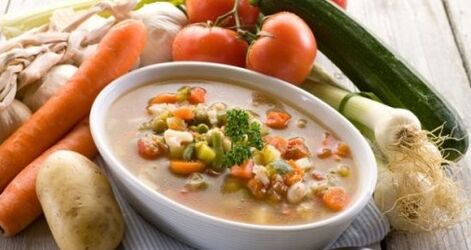
Basic rules
The main task of the diet in gastritis is to adhere to a diet that ensures normal digestion. The table for the treatment of gastritis (per day) should contain:
- 90-100 g squirrel (and 60% animals),
- 50-80 g of fat (75% of animals)
- 300-320 g of carbohydrates.
Diet rules for gastritis:
- Knowledge of the measure. In gastritis, the saying "after a meal there should be a feeling of mild hunger" is more relevant than ever. First, the feeling of satiety appears only 10-15 minutes after a meal and, secondly, a full stomach does not cope well with its functions, especiallywith gastritis.
- Diet. First, you need to monitor your food intake (simultaneously). Secondly, in gastritis the food should be partial, 4-5 times a day, but at the same time it is necessary to give up snacks (they provoke the "excess" secretion of gastric juice and reduce its production during breakfast / lunch /dinner, which disrupts the processes of processing and assimilation of food). You should definitely exclude reading while eating, watching TV and "running on the go".
- Rest after eating. After each meal you should rest for 15-20 minutes (no need to sleep). You can read a book or listen to music.
- Chewing food. Prolonged chewing of food (at least 25-30 seconds for each piece) contributes to a more in-depth mechanical processing of food, which facilitates the work of the sick stomach. In addition, hunger in this case is satisfied faster (which prevents overeating). Refusal of complex dishes
The total energy value should be 2200-2800 kcal.
High acidity diet
In this form of gastritis, it is recommended to use a diet aimed at thermal and mechanical sparing of the stomach, as well as to reduce gastric secretion.
Allowed products:
- casseroles, cheesecakes, dumplings, baked cheesecakes in the oven;
- milk, especially tea, all kinds of fermented milk products, including yoghurt and yoghurt, fresh cottage cheese puree;
- fish, meat or chicken soups prepared in cereal broth;
- dry white crackers, vegetables and butter, milk soups with cereals or pasta;
- steamed omelets, eggs in a bag, vegetable dishes in the form of mashed potatoes, puddings, souffles, weak tea, sweet fruits and berries in jelly, creams and compotes;
- beef, lean beef, chicken in the form of meatballs, puddings, zraz, steamed meatballs (1-2 times a week is allowed to eat lean cooked meat in pieces).
Prohibited products:
- oily mushrooms and meat broths;
- carbonated drinks;
- smoked meats with spices;
- raw vegetables, pickles, pickles, spicy vegetable snacks, lemon juice;
- black bread.
The purpose of the diet is to exacerbate gastritis with high acidity to normalize the functioning of the intestines and stomach, limiting thermal, chemical and mechanical stimuli.
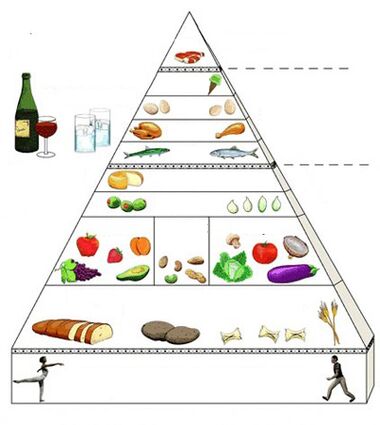
Low acidity diet
The purpose of the diet in gastritis with low acidity is to stimulate (in moderation) the production of gastric juice, as well as mechanical sparing of the stomach.
Prohibited foods in hypoacid gastritis:
- restriction of pearl barley, legumes, millet;
- fresh bread, baked goods ("heavy" food for the stomach, complicates chemical and mechanical processing);
- oily and salted fish;
- vegetables and fruits with coarse fiber (white cabbage, turnips, radishes, cucumbers, peppers), mushrooms;
- fatty meat, meat with fascia (films), canned food, smoked meat (inadequate mechanical processing of food, excessive release of hydrochloric acid);
- spicy and salty cheeses, milk - neutralizes hydrochloric acid;
- fruits with grains or thick skin (raspberries, strawberries, red currants, gooseberries, figs);
- spices and herbs (irritate the gastric mucosa), as well as chocolate, grape juice, alcohol;
- lard and lard, pork, lamb, lamb (not absorbed due to low production of hydrochloric acid, difficult to digest products)
The food should be taken after the beginning of the secretion of hydrochloric acid, ie in the first phase (advertising or shows about food, beautiful pictures of food, "delicious" conversations can provoke the secretion of gastric juice).
Diet for acute gastritis
Special attention should be paid to the diet in acute gastritis. The requirements for the products are the same as for all types of this pathology, but stricter.
In the acute form of the disease it is recommended:
- low-fat cottage cheese;
- white bread from yesterday and without pastries or muffins;
- only lean meat, cooked and mashed or finely chopped;
- soups exclusively of vegetable broths;
- non-acidic compotes and jellies;
- soft-boiled eggs or in the form of a steamed omelet;
- vegetable purees from the range of baby foods, it is also good to borrow fish and meat purees from a jar of babies;
- teas or infusions without sugar.
During the period of immediate exacerbation, they are completely excluded from the menu:
- products with preservatives, flavor enhancers, artificial colors;
- raw vegetables and fruits;
- milk and all kinds of dairy dishes;
- all kinds of pastries except yesterday's bread;
- margarine, cooking oil and butter;
- pearl barley;
- all kinds of beans and beans.
Also, all general restrictions on the products themselves and the methods for their preparation remain in force. The crisis usually passes in 3-4 days, after which the diet becomes more varied, in accordance with the general recommendations for patients with gastritis.
Sample menu for a week
To get an idea of the diet, you can look at the approximate diet menu for gastritis for a week with recipes. There is a clear fractional diet: eating several times a day. Such a food for a week looks attractive and meets energy needs thanks to a well-thought-out calorie content.
Day 1:
- Breakfast - buckwheat, milk souffle, tea.
- Breakfast - 1 cup of sweet oatmeal.
- Lunch - slimy rice soup, spaghetti with beef zrazy, boiled carrots and peas, cocoa with milk.
- Afternoon snack - fermented milk curd.
- Dinner - vegetable casserole, steamed meatballs, light herbal decoction with honey.
- Before going to bed - 1 cup of fruit jelly.
Day 2:
- Breakfast - boiled egg, dried bread, boiled oatmeal, decoction of apple and rose hips.
- Second breakfast - compote of boiled dried fruits (1 cup) and dry biscuit.
- Lunch - buckwheat soup, pumpkin puree, chicken zrazy, tea with milk (sugar can be added).
- Afternoon breakfast - 1 glass of milk, yogurt, kefir and toast (fried bread is unacceptable).
- Dinner - noodles with steamed beef balls, vegetable salad with sour cream, cocoa. Before bed: 250 grams of low-fat fermented milk.
Day 3:
- Breakfast - oatmeal, boiled fish, tea with milk;
- Second breakfast - milk jelly.
- Lunch - vegetable soup with chicken, mashed potatoes and carrots, steamed cutlet, cocoa with milk.
- Afternoon snack - fermented milk curd.
- Dinner - meatballs with boiled peas, toast, dried fruit compote.
- Before going to bed - kefir or milk.
Day 4:
- Breakfast - fermented milk cottage cheese with honey, toast, dried fruit compote.
- Second breakfast - kefir or 1 glass of milk.
- Lunch - mashed potatoes soup, casserole with vegetables and rabbit, dried fruit compote.
- Afternoon snack - mousse or milk souffle with fresh fruit.
- Dinner - rice porridge with boiled rabbit, boiled carrots and peas, tea with milk.
- Before going to bed - cocoa with milk and 2 pieces of biscuits with oatmeal.
Day 5:
- Breakfast - boiled egg, dry bread, boiled oatmeal, cocoa with milk.
- Breakfast - 1 cup of sweet oatmeal.
- Lunch - pea soup, steamed fish, roasted pumpkin.
- Afternoon snack - milk jelly.
- Dinner - vegetable casserole, steamed fish, rosehip broth.
- Before going to bed - 1 cup of kefir and oatmeal.
Day 6:
- Breakfast - buckwheat milk groats, milk souffle, tea.
- Second breakfast - baked fruit and a glass of milk.
- Lunch - soup with cauliflower, zrazy with rice, cocoa with milk.
- Afternoon breakfast - vegetable casserole and tea.
- Dinner - steamed fish with carrots and peas, salad with vegetables and sour cream, rosehip decoction.
Day 7:
- Breakfast - baked apples stuffed with cottage cheese, toast, juice.
- Second breakfast - kefir or milk.
- Lunch - vegetable soup with chicken, mashed potatoes and carrots, steamed cutlet, cocoa with milk.
- Afternoon snack - fermented milk cottage cheese with honey.
- Dinner - noodles with boiled chicken, roasted pumpkin, cocoa with milk.
- Before going to bed - 1 cup of fruit jelly.
The acute stage of the disease with such a diet will quickly pass into a stage of remission of gastritis.
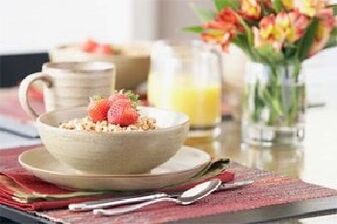
Menu of the week, option number 2
People who follow a diet for gastritis are advised to plan their menu in advance for a week with recipes. A clear plan of action will help you avoid unhealthy snacks. It is much easier when the necessary food is prepared in the patient's refrigerator. And one knows how and what can be prepared quickly from them.
Monday:
- In the morning - 7: 00. Fish steamed cutlets. Boiled potatoes. Tea.
- Strengthening - 10: 00. Low-fat cottage cheese.
- Lunch - 13: 00. Pearl barley soup with vegetables. Buckwheat porridge with boiled meat. Compote.
- Reinforcements - 16: 00. Sweet biscuits. Carrot juice.
- Dinner - 18: 30-19: 00. Chicken meatballs, baked in the oven. Mashed potatoes in water. Charlotte. Tea.
- At night - 21: 00. A glass of low-fat kefir.
Tuesday:
- In the morning - 7: 00. Oatmeal with protein omelet. Tea.
- Strengthening - 10: 00. Baked apples.
- Lunch - 13: 00. Low-fat vegetable soup. Rice porridge with boiled chicken. Compote.
- Reinforcements - 16: 00. Sweet biscuits. Rosehip drink.
- Dinner - 18: 30-19: 00. Mashed potatoes with a piece of lean fish. Gris pudding. Sour.
- Overnight. A glass of low-fat kefir.
Wednesday:
- In the morning - 7: 00. Rice porridge with turkey balls. Tea with milk.
- Strengthening - 10: 00. Casserole with cottage cheese with low-fat sour cream.
- Lunch - 13: 00. Vegetable soup. Rabbit cutlets steamed with vegetable stew. Compote.
- Reinforcements - 16: 00. Sweet biscuits. Rosehip drink.
- Dinner - 18: 30-19: 00. Oatmeal in half milk with chicken meatballs. Juice of fresh berries.
- At night - 21: 00. A glass of low-fat kefir.
Thursday:
- In the morning - 7: 00. Boiled tongue. Semolina porridge with half the milk. Tea.
- Strengthening - 10: 00. Baked apple.
- Lunch - 13: 00. Vegetable soup with fine noodles. Mashed potatoes in water with boiled turkey. Compote.
- Reinforcements - 16: 00. Biscuit cookies. Rosehip drink.
- Dinner - 18: 30-19: 00. Potato casserole with minced meat. Tea.
- At night - 21: 00. A glass of low-fat kefir.
Friday:
- In the morning - 7: 00. Buckwheat porridge with protein omelet. Tea with milk.
- Strengthening - 10: 00. Sour.
- Lunch - 13: 00. Vegetable soup. Chicken meatballs with boiled vegetable puree. Compote.
- Reinforcements - 16: 00. Sweet biscuits. Dried fruit compote.
- Dinner - 18: 30-19: 00. Mashed potatoes with boiled fish. Tea.
- At night - 21: 00. A glass of low-fat kefir.
Saturday:
- In the morning - 7: 00. Oatmeal with half the milk. Steamed fish cakes from lean fish. Tea.
- Strengthening - 10: 00. Low-fat fresh cottage cheese. Baked apple.
- Lunch - 13: 00. Vegetable soup. Boiled potatoes. Veal stroganoff. Compote.
- Reinforcements - 16: 00. Sweet biscuits. Tea.
- Dinner - 18: 30-19: 00. Fish baked in the oven. Mashed carrots. Tea.
- At night - 21: 00. A glass of low-fat kefir.
Sunday:
- In the morning - 7: 00. Oven-baked souffle. Oatmeal with half the milk. Tea.
- Strengthening - 10: 00. Carrot-apple souffle.
- Lunch - 13: 00. Vegetable rice soup. Buckwheat porridge with steamed rabbit meatballs. Carrot and banana juice.
- Reinforcements - 16: 00. Sweet biscuits. Tea.
- Dinner - 18: 30-19: 00. Mashed potatoes in water. Boiled fish. Rosehip drink.
- At night - 21: 00. A glass of low-fat kefir.
How much diet should be followed in gastric gastritis? Strict control is needed during exacerbations and in the first months thereafter. But ideally, a patient diagnosed with gastritis should adhere to the recommended table during remission. However, menu extensions and holiday exceptions are possible. Although only within reasonable limits and not to mention coffee, cigarettes, alcohol and fatty foods.
Recipes for gastritis
Nutrition offers various recipes for diversifying the diet for gastritis in adults and children. They have delicate modes of heat treatment, do not use spices and fats.
The main rule for feeding a sick stomach: the food should be at a medium temperature. Hot or cold food will worsen ulcerative gastritis. Below we will describe some recipes for eating at home with stomach ailments.

Veal zrazy
Products:
- 200 g lean beef or veal;
- 20 g of cooked rice;
- 30 g biscuits;
- half a teaspoon of oil.
Preparation:
- Grind the meat in a blender or meat grinder.
- Add crackers.
- Shape the cake.
- Place rice and oil in the center of each. It will add a creamy taste.
- Form a zraz and send to a double boiler or multicooker for 15 minutes.
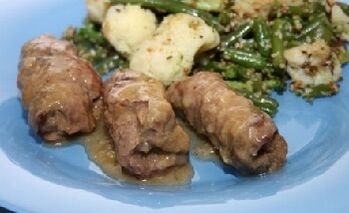
Steam beads
Composition:
- beef - 200 g,
- roll - 10 g,
- butter - 10 g.
Combine the meat, cut in a meat grinder, with stale bread soaked in water and go through a meat grinder. Add water, salt and crush well. Shape the meatballs and simmer.
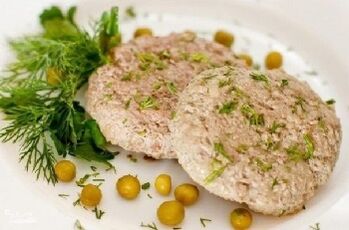
Jelly fish
Products:
- pike - 200 g,
- carrots - 5g
- gelatin, egg - 1/4.
Preparation:
- The cleaned fish is finely chopped and boiled in pre-cooked vegetable broth.
- Swollen gelatin is added to the resulting broth, mixed well and filtered through double gauze.
- The fish is placed in a bowl or mold, the bottom is decorated with chopped carrots, poured with strained broth and cooled.
- Pieces of fish are poured with broth and cooled.
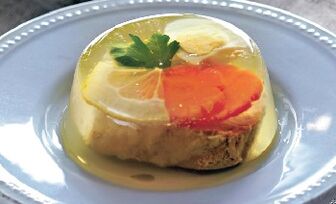
Cottage cheese cream
Products:
- curd weight - 100 g,
- sugar - 25 g
- butter, egg - 1/4,
- sour cream - 20 g,
- vanilla sugar,
- milk - 30 g,
- flour - 5g.
Preparation:
- prepare a sauce of flour, milk, eggs and sugar.
- egg yolk is ground with wheat flour and sugar,
- pour boiling milk over it and heat, stirring constantly, until thickened,
- oil is added to the cooled mass.
- grated cottage cheese, vanilla sugar, sour cream are added to the resulting mixture,
- the whole mass is ground well and placed in a salad bowl.

Milk soup with breadcrumbs
Products:
- milk - 400 g,
- sugar, biscuits - 50 g,
- egg yolk - 1/3,
- vanilla, oil, water - 50g.
Preparation:
- Crushed white crackers are added to the milk and water, bringing to a boil.
- To the milk removed from the heat, add the yolk, ground with sugar, butter before serving.
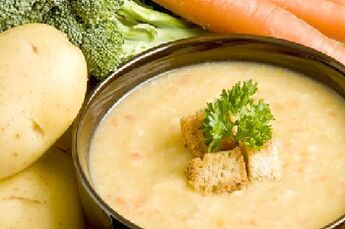
Can I . . .?
What is allowed and what is not? List of basic foods and beverages.
- Fish - only low-fat species of marine fish such as mint, cod, hake. Among river fish, pike and pike are the best. It is better to completely abandon canned fish and fried fish, during their production all the useful properties of each fish are lost and many spices and preservatives, carcinogens can be obtained more than obtained. As with meat, it is best to steam the fish by limiting the spices.
- Coffee - it is absolutely impossible to drink black coffee with gastritis on an empty stomach, even in large quantities, especially with increased stomach acidity. In case of low acidity, coffee or cocoa with milk is allowed, but only in limited quantities.
- Meat - you can eat with gastritis, but only low-fat varieties - beef, beef, chicken, rabbit. Steamed cutlets are especially useful for gastritis, as the meat is cut into small pieces and steamed. If it is only steamed meat, it should be chewed very carefully and not overdone, as any meat product is a burden on the stomach. Naturally, neither smoked nor cooked smoked sausages and sausages can be used in gastritis.
- Cheese - spicy or too salty cheeses are not allowed in any gastritis, even ordinary hard cheese should be eaten in limited quantities in small slices.
- Bananas - Can bananas be used for gastritis? It is a healthy fruit that is low in fiber, soft, easy to digest and contains many of the nutrients the body needs. And although diet № 5 forbids fruits such as dates, bananas, many gastroenterologists believe that their moderate consumption can not harm and bananas should and can be eaten with gastritis.
- Watermelon is something you can eat with gastritis, but only very little. With any acidity you can eat only 1-2 slices.
- Melon is almost the hardest plant product not only for the stomach, but also for the pancreas and gallbladder. The digestive tract of even a perfectly healthy person has a hard time dealing with melon, so anyone suffering from gastritis should give up such a dubious product.
- Chocolate - it is better to give up this product completely.
- Nuts, seeds, legumes - in gastritis should not use any type of nuts, the same applies to seeds and legumes.
- Honey can be used because it has healing properties on wounds and is considered a fortified and useful product. However, everything is fine in moderation, especially since many people may be allergic to bee products.
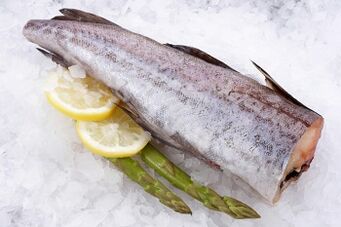
Is it possible to completely get rid of gastritis?
In mild cases of superficial gastritis, it is possible to cure it completely if you lead a healthy lifestyle and follow the following strict rules, which in practice proves to be quite a difficult task:
- Feeding should be 5-6 times a day, at certain hours, the last meal should be at least 2 hours before bedtime.
- Constant adherence to diet, no dry food, fast food.
- Avoid smoking and drinking.
- Eliminate any overeating and long breaks in meals.
- Lack of physical exertion, constantly monitor the condition of the body, do not overwork, do not overwork, sleep at least 8 hours a day at night and preferably 1 hour during the day.
It is also worth working on yourself to develop stress resistance (stress resistance) or to exclude psycho-emotional overload.













































































